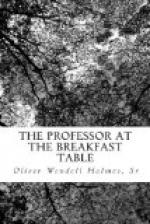Beverly farm, mass., June 18, 1891.
O. W. H.
The professor
Atthe
breakfast-table.
What he said, what he heard, and what he saw.
I
I intended to have signalized my first appearance by a certain large statement, which I flatter myself is the nearest approach to a universal formula, of life yet promulgated at this breakfast-table. It would have had a grand effect. For this purpose I fixed my eyes on a certain divinity-student, with the intention of exchanging a few phrases, and then forcing my court-card, namely, The great end of being.—I will thank you for the sugar,—I said.—Man is a dependent creature.
It is a small favor to ask,—said the divinity-student,—and passed the sugar to me.
—Life is a great bundle of little things,—I said.
The divinity-student smiled, as if that were the concluding epigram of the sugar question.
You smile,—I said.—Perhaps life seems to you a little bundle of great things?
The divinity-student started a laugh, but suddenly reined it back with a pull, as one throws a horse on his haunches.—Life is a great bundle of great things,—he said.
(Now, then!) The great end of being, after all, is....
Hold on!—said my neighbor, a young fellow whose name seems to be John, and nothing else,—for that is what they all call him,—hold on! the Sculpin is go’n’ to say somethin’.
Now the Sculpin (Cottus Virginianus) is a little water-beast which pretends to consider itself a fish, and, under that pretext, hangs about the piles upon which West-Boston Bridge is built, swallowing the bait and hook intended for flounders. On being drawn from the water, it exposes an immense head, a diminutive bony carcass, and a surface so full of spines, ridges, ruffles, and frills, that the naturalists have not been able to count them without quarrelling about the number, and that the colored youth, whose sport they spoil, do not like to touch them, and especially to tread on them, unless they happen to have shoes on, to cover the thick white soles of their broad black feet.
When, therefore, I heard the young fellow’s exclamation, I looked round the table with curiosity to see what it meant. At the further end of it I saw a head, and a—a small portion of a little deformed body, mounted on a high chair, which brought the occupant up to a fair level enough for him to get at his food. His whole appearance was so grotesque, I felt for a minute as if there was a showman behind him who would pull him down presently and put up Judy, or the hangman, or the Devil, or some other wooden personage of the famous spectacle. I contrived to lose the first of his sentence, but what I heard began so:




